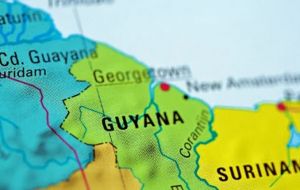MercoPress. South Atlantic News Agency
Guyana Venezuela territorial dispute at the Court of Justice, but Caracas denies The Hague jurisdiction to rule
 “In view of the current C19 pandemic, the court has opted for a mix of physical and virtual presences during the hearing,” ICJ President Abdulqawi Yusuf said
“In view of the current C19 pandemic, the court has opted for a mix of physical and virtual presences during the hearing,” ICJ President Abdulqawi Yusuf said The United Nations’ top court held its first virtual hearing on Tuesday, taking up a 120-year-old territorial dispute between Guyana and Venezuela. Guyana made its arguments as to why the International Court of Justice has jurisdiction in the border dispute, which calls into question the ownership of more than half of the ex British colony.
“In view of the current Covid-19 pandemic, the court has opted for a mix of physical and virtual presences during the hearing,” ICJ President Abdulqawi Yusuf said while wearing a face shield at the outset of the afternoon hearing.
Some of the judges present opted for similar face coverings, while others wore surgical masks and some wore nothing at all. Hearings in the case had been scheduled for March but were delayed due to the coronavirus outbreak.
Tuesday’s legal arguments focused on whether The Hague-based court has jurisdiction to hear the case on the merits. The controversy was referred to the ICJ by UN Secretary-General António Guterres in 2018 after yet another failed attempt to resolve the dispute.
“Very respectfully we inform that given that Venezuela did not accept the jurisdiction of the court, the Bolivarian Republic of Venezuela will not participate,” Venezuela President Nicolas Maduro wrote in a letter read out by the court ahead of the hearing.
Venezuela has argued that the 1966 Geneva Agreement, which attempted to solve the disagreement, requires disputes to be resolved in a manner agreed upon by both parties.
But Paul Reichler of international law firm Foley Hoag, representing Guyana, argued that Venezuela misunderstood the terms of the agreement.
“It’s like Venezuela stopped reading Genesis after the creation of the fifth day before humans were created. Perhaps the planet would be better off, but both continue,” he said, getting smiles from the judges. Reichler would later get a laugh out of the court president over a joke about having “virtual” coffee during the court’s break.
The conflict predates Guyana’s status as an independent nation. The disputed region was a former Dutch colony, which Britain obtained in an 1814 treaty. When Venezuela declared independence from Spain, it disagreed on the border with its neighbor to the east.
By the end of the 19th century, Great Britain and Venezuela finally agreed to take the conflict to a tribunal, which in 1899 awarded the disputed 61,600 square miles to what was then known as British Guiana.
“More than 120 years have passed since international law spoke,” Sir Shridath Ramphal told the ICJ on Tuesday.
The Guyanese politician was representing his nation at the hearing. He noted that the tribunal reached its decision exactly 29 years before he was born.
The dispute was settled until 1962, when Venezuela made another claim on the territory. Two Americans, two Britons and one Russian made up the original tribunal and Venezuela has called the 1899 award an “Anglo-Russian conspiracy.”
“The Venezuelan authorities have not provided a single shred of evidence to support their claims,” said Payam Akhavan, an international lawyer and professor at Montreal’s McGill University who is also representing Guyana.
Venezuela further escalated tensions in 2018 when it seized a ship exploring for oil in coastal waters claimed by both countries. A ruling on jurisdiction is expected in the coming months.




Top Comments
Disclaimer & comment rulesCommenting for this story is now closed.
If you have a Facebook account, become a fan and comment on our Facebook Page!